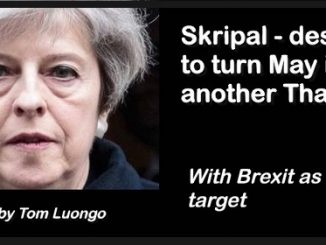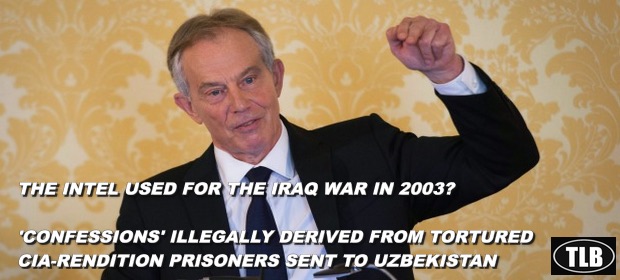
Former British ambassador Craig Murray on the UK’s decision to invade Iraq and the lessons still not learned.
Craig Murray
The recent Iraq Inquiry (commonly dubbed the Chilcot report) was in many respects highly critical of Tony Blair and other key figures in the British government’s decision to follow the United States to war in 2003.
However, it stopped short of accusing anyone of willful deceit in making the case for invasion, and expressed no opinion as to the legality of that invasion.
The 2003 Iraq War was conducted in the face of huge public opposition and mass, worldwide protests. For many people, it threw the nature of Western democracies into doubt and contributed to a collapse of trust in the political establishment. For Iraqis, the invasion was a disaster of unimaginable proportions.
Many questions remain about why the war was launched and, in particular, how the intelligence in support of claims that Saddam Hussein possessed weapons of mass destruction (WMDs) was compiled and presented.

Craig Murray was British ambassador to Uzbekistan from 2002 to 2004. He was dismissed after revealing evidence that intelligence used by the British government in the “war on terror” had been obtained through torture, with suspects flown to Uzbekistan. Jacobin‘s Duncan Thomas talked to him about Chilcot, the buildup to the Iraq War, and the internal machinations of the British state.
____________
You were UK Ambassador to Uzbekistan from 2002 to 2004, before resigning due to certain evidence you uncovered. Can you say a little about how you went from a high-ranking official of the British state to an antiwar activist?
I became ambassador to Uzbekistan shortly after the invasion of neighboring Afghanistan. The British government had a policy of collaboration with the Uzbek dictatorship, which provided an airbase for the Americans to operate into Afghanistan.
However, I discovered that this policy of collaboration not only included downplaying the terrible human rights abuses of that dictatorship, but also intelligence collaboration, by which I mean that our government was knowingly getting intelligence from the Uzbek torture chambers, very often from the torture of dissidents who had no connection with terrorism whatsoever.
The purpose of the intelligence was to exaggerate the threat of Al Qaeda from Central Asia — in fact, it’s probably not going too far to say that the purpose was to invent the threat.
Obviously, both the immoral and illegal torture itself and the intelligence obtained from it, as well as the use of that information to paint to a false intelligence picture, was something I just couldn’t go along with.

UK, US, and Iraqi soldiers at a checkpoint in Basra, Iraq in 2008. U.S. Army / Flickr
Were these Uzbeki victims exclusively, or were people flown in from around the world?
At the time, I was only aware of Uzbek victims. I later obtained information, quite literally in a pub from CIA operatives who were engaged physically in doing it, that people were being flown in from around the world.
Initially, I assumed that they were also Uzbek. I subsequently discovered that they weren’t, and that people were being flown in from all over the world who had no connection with Uzbekistan.
It was just being used as an extraordinary rendition destination. But I resigned before I discovered that, and at the time I believed it was just Uzbek victims who were being tortured.
A good enough reason on its own, I suppose. Presumably you tried to raise some of these issues internally before you decided to walk.
Oh yes. I spent a year fighting the office internally without going public. I sent top-secret telegrams to Jack Straw directly on the subject. So I did everything I could to change the policy internally.
I started from the rather naive view that ministers must not know about this, that it must just be rogue elements within Mi6, and that all I had to do was bring it to a sufficiently high level of attention and for it to be stopped.
It really didn’t occur to me at the start that ministers were deliberately getting their evidence from torture.

extraordinary rendition
Before that role, in the 1990s, you were in another position for the Foreign and Commonwealth Office, as head of their section of the Embargo Surveillance Center. This was responsible for monitoring Iraqi attempts to procure prohibited weapons during the sanctions period.
What was your impression of their capability back then, and was there ever a time when you thought that they may be restarting serious weapons programs?
We were responsible not just for monitoring, but for organizing physical interception of Iraqi attempts at weapons procurement. It was a fascinating job, because you saw how the international arms trade works — or, I suppose, the illegal or sanctions-busting side of the arms trade, as opposed to the legal but still deadly side of the arms trade.
The work we did often involved following the money. We were getting intelligence on specific movements of currency between banks and arms dealers, and between arms traders and arms companies and manufacturers, often arms manufacturers in the imperial United States.
We’d then try to link those payments to particular shipments of arms and see where they were going. This involved both a lot of electronic surveillance and quite literally sending spies poking around dockyards on occasion. So it was very interesting work.
We knew that Iraq had a very substantial chemical weapons program and a very substantial stock of chemical weapons, but we also knew that in large part these were getting very outdated. I should say, first of all, that they were not at all sophisticated.
This is one of the ellisions that Blair and other government spokespeople made quite frequently. When they said WMD or “chemical weapons,” you imagined they were referring to some sort of intercontinental warhead, not just some mustard gas strapped to a regular battlefield missile.
That’s right. But there was no question that they did not have a substantial range and that they were not much use except against massed troops. They were not very much more advanced than standard WWI mustard gas. We also knew that they were degrading — these things have a shelf life, so they don’t stay active.
But the biggest problem that we had, of course, was that they had almost all been supplied by Western arms manufacturers. So we were continually coming up against questions of historic links.
We’d come across bank transfers being made which were for weapons that had been shipped seven years before and just hadn’t been paid for yet. It really opened our eyes to the fact that the West had been arming Saddam Hussein knowingly with all this stuff for years.
In the midst of all that, we had a case that was famous at the time, called the Matrix Churchill case [after the name of the British arms company involved], where Mi6 were actively involved with a Western arms company in a transaction with Iraq which had been ongoing at the time that the sanctions came into force and then continued into the sanctions period.
The company that was supplying the arms stood to make a substantial loss if they simply pulled the plug, and as they had been doing it in collaboration with Mi6, they thought they should just be allowed to go ahead and continue.
But the whole involvement of the West was very cloudy morally, to say the least, and that became very clear through my work.
Concerning how intelligence was presented, Chilcot says:
“The intelligence and assessments made by the [Joint Intelligence Committee] about Iraq’s capabilities and intent continued to be used to prepare briefing material to support Government statements in a way which conveyed certainty without acknowledging the limitations of the intelligence ….
The JIC Assessments contain careful language intended to ensure that no more weight is put on the evidence than it can bear. Organising the evidence in order to present an argument in the language of Ministerial statements produces a quite different type of document.”
To me, this sounds very much like the government was lying or being intentionally misleading, yet Chilcot insists that there is no evidence of willful deceit. You’ve actually gone further and said that not only was evidence misrepresented — some of it was fabricated. Can you substantiate this?
Chilcot says that the JIC assessments were quite carefully worded to put in caveats about how reliable the intelligence was, and that those caveats were removed when it was presented to Parliament in order to make it sound more certain.
I’d say it was worse than that. A lot of material went into the JIC assessments that would never have got through the standard set of filters, had civil servants not been aware that the government really wanted it in.
This was largely conscious and intentional — I think people did it from a sense of “this is what government wants, and I’d better give it them.”
In fact, there were memos going round from senior officials telling people to do exactly that, that we should fix the intelligence to give this impression. I quote one of these messages in my review of Peter Oborne’s book, Not the Chilcot Report. So some of it was explicit. Other bits were simply that you know what government wants, so you give it to them.
And I have to say that, having been a civil servant in a policy department, that’s something you do all the time. It’s kind of natural.
For example, when I was on the Foreign Office South Africa desk during apartheid, everyone knew that Thatcher was very supportive of the existing regime. The official government line at that time was that Mandela was a terrorist and he should be in prison.
There would have absolutely no point in me drafting minutes saying “he is a good man and we should be campaigning to get him out,” because they wouldn’t get anywhere.
So I drafted minutes explaining that it was in the British “business interest” to secure his release, arguing that it would be best not to annoy the black community in South Africa, because one day they might be in power and we would have to deal with them to make money. That’s the only kind of argument that would get anywhere with the government.
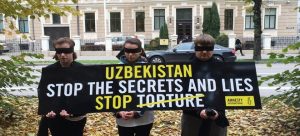
As a civil servant your job is to implement the policy the government wants. You can try to do some good by coming up with a financial argument, rather than a moral one, for opposing apartheid or whatever, but you have to go with the flow of what the government wants.
In a sense, that’s what people were doing with the intelligence. If I’ve used the word “fabricated,” that’s probably not quite right. What they did was remove the filters.
In this regard, it’s important to understand that there are two different types of intelligence. There’s “signal intelligence,” known as “SigInt,” and “human intelligence,” or “HumInt.” Signal intelligence is any form of intercepted communication.
At that time, it would have mostly been phone taps and stuff that doesn’t really exist much anymore, like telex and that sort of thing. Not much of it would have been internet-based.
With signal intelligence, unless it has been deliberately faked because they knew it would be intercepted, most of the time it’s simple: what you see is what you get. Human intelligence is very different. Someone is telling you something, and you have to assess its validity.
The vast majority of human intelligence comes from people whose motivation for talking is that they are being paid to do so — that’s how Mi6 works. So you have to assess whether you trust the person, how much access they really have to the relevant material, and so on.
An awfully high percentage of human intelligence is of very low quality, and a lot of it is absolute dross. When you think about it, it’s bound to be. Anyone who’s giving information to a foreign government for cash is by definition not the most scrupulous person. And the information they provide is often unreliable.
In the case of the Iraqi WMD information in the “dodgy dossier,” I know that the source was an Iraqi colonel who was meeting Mi6 in a hotel room in Egypt and was being given literally millions of dollars in cash in a briefcase for the information he provided. There was no corroboration for this — it was was just his word.
Normally, you would put huge question marks over the intelligence he provided and his motive for giving it — as you would with anyone who’s being paid millions of dollars to tell you stuff. So all this intelligence existed, in the sense that people like this Iraqi colonel provided it to us. Whether it was true or false or not is another question.
Normally, there are very strong filters to eliminate this kind of thing. When you sit on committees of the JIC, as I have done, you go through this sort of intelligence. You query it, and you say to Mi6, “This doesn’t seem very credible. How good is your source? Where did he get his access? Why is he telling you this?” And so on.
So very often, before it goes up to a higher level, material will get left out. That’s what the JIC and the sub-committees are for. You can reject things as unreliable.
So normally ministers and the cabinet and so on wouldn’t even see that stuff when it comes to decision-making?
Exactly, it would never get higher. The people able to judge its reliability would take it out. Most of that absolute dross — including the stuff that was taken from somebody’s PhD research [to support claims of WMD] — would have got filtered out.
But there was so much knowledge in the system that the government was already committed to war — and frankly, everyone knew that they were absolutely determined — that people took off the filters. So intelligence that was obvious nonsense was let through.
It had been years since I’d been in charge of the Iraqi weapons procurement brief, but my successors knew that some of the claims just weren’t at all possible. Yet because the filters had been taken off, this intelligence was let through in order to build up a false case. So perhaps not “fabrication” exactly.
But fabricated evidence would have got through. It’s not necessarily the British government themselves that did the fabricating, but they allowed fabricated intelligence to become part of the case. Is that right?
Yes.
This is where a lot of ambiguity comes in between this being conscious manipulation on the one hand, or procedural “error” on the other. For that kind of breakdown of bureaucratic processes to occur, do you need certain individuals who take conscious decisions to remove those filters?
Yes, you do. Definitely in the normal run of things, those filters would come into play. And there were parts of the Whitehall machine which did try to apply normal procedures and talk sense, the main one being the Defense Intelligence Service. The head of the DIS told Chilcot that they weren’t in agreement with the JIC assessment.
There was also a department in the Foreign Office called the Research Analysts Department, who provided expert analysis on whatever subject, and they queried the information quite strongly.
I was actually told by a member of this team directly that he had seen members in tears because they’d been threatened with losing their jobs if they didn’t withdraw their opposition. So yes, there was conscious intimidation going on.
It’s interesting to hear about these conflicts between different parts of the British state machinery. How widespread would you say this was?
Well, there’s no doubt that within the Foreign Office, a large majority of ambassadors and senior diplomats were quite strongly opposed to the Iraq War. We were sending each other private emails and messages all the time about our opposition to it.
At exactly this time, at the end of 2002 and the beginning of 2003, I was sending my telegrams from Tashkent on getting intelligence from torture and the fact that the intelligence was rubbish. Those messages were copied to ambassadors around the world as well as Jack Straw.
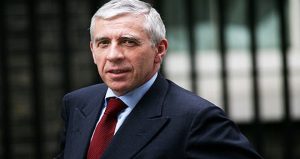
Jack Straw
That was part of our attempt to push back against Mi6 and the government. There was a lot of that kind of resistance. And around 120 former ambassadors also signed a letter opposing the Iraq War, which was also the view of the serving ambassadors.
But one of the fascinating things about all of this was the unwillingness of people to push things to the point of losing their job.
So when do you think the decision to invade was actually taken, and what do you think the motivations were behind it? Was it as simple as the British state trying to secure control over oil resources and other opportunities for British capital?
Was the British state trying to secure relative prestige in the US-dominated imperialist system, or did the United Kingdom have its own distinctive interests to pursue?
It became absolutely clear to me from maybe the spring of 2002 that we were going to invade Iraq.
Motivation is something we all wondered about at the time. It seemed to me to be primarily a matter of Tony Blair’s huge desire for Britain to be seen as a great power and important in the world, and the way to do that was to be indispensably connected to the United States. I don’t think it was much more detailed than that.
So just imperial prestige as an end in itself? Just to appear important?
Yes, I think so. Because if the United Kingdom was an extremely important international player, that made Tony Blair also an extremely important international player. I think it was a sort of dying imperial reflex or something.
Obviously, yes, there were hard-nosed interests in oil and gas and so on, and my guess is that if Iraq didn’t have these resources then this whole thing would never have happened.
But I don’t think that was the driving motivation. It was driven more by this kind of messianic power hunger from Number 10 [the prime minister].
Did any of the conclusions of Chilcot surprise you, and do you think that, despite its obvious limitations, we can use any of that evidence to push things further, ultimately to see Blair charged with war crimes or something like that?
Well, I don’t think there’s enough whitewash in the world to completely cover up what happened. So I’m not surprised that the main outlines of the report are broadly correct.
But I was surprised at how firm Chilcot’s opening statement was. There was much less fudge than I expected.
As to legality and questions of prosecuting Blair and others involved, he said that he didn’t have the power to determine whether it was illegal or not, but that the procedures on the legal advice were wrong. This came as close as he possibly could to saying it was illegal.
So he left the question open, with a strong hint that it was illegal. In this regard, I thought it was much stronger than I expected, given the thoroughly establishment nature of the committee.
On the other hand, I think it was unfortunate that he fudged the question of how the intelligence was put together. He managed to say that it wasn’t the JIC’s fault, because they’d given an honest assessment that had been presented wrongly by Number 10.
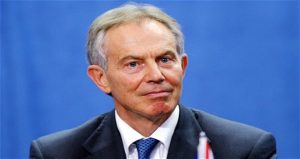
Tony Blair
But at the same time, he managed to say that the compilation of the dossier itself that presented the intelligence wrongly was also done with good intentions! So he completely avoided the lie that was at the center of this, which is absolutely what I expected.
But within that boundary, the criticisms were very fierce, including the criticisms of postwar planning. I wasn’t surprised by that at all, because that actually fits in with the message that what we have to do is spend more on our armed forces.
But he was harder on Tony Blair and on the decision to go to war, and on the fact the Blair had irrevocably committed to war long before he’d claimed to the public, and of the damage he did to the United Nations through how he went about getting resolutions — all that was much firmer than I thought it might be.
Can we speculate as to why Chilcot was firmer than we thought he might be? Is this, as will be claimed, an example of the British state and the procedures of accountability showing that they are actually functional, or do you think that his firmness was more due to the huge public outrage and mobilization around the war?
Or perhaps even more than that, the divisions within the British state itself, with some parts of the military and intelligence community, for example, being very angry about Iraq?
The Chilcot inquiry made very plain that there were major parts of the British establishment that were not at all happy about what had happened. The main anger and opposition came from the Army, the Defense Intelligence Service, Mi5, and the Foreign Office legal department — which contains some of the world’s most respected public international lawyers, who had unanimously advised that the war would be illegal.
So there are important sectors of the British establishment that were outraged by what had happened, and the power of those parts of the establishment comes through in the report.
But of course, by his avoidance of the problems of the actual preparation or fabrication of the intelligence and the lies told to Parliament, he’s let the security services off the hook. He hasn’t actually criticized Mi6. And most importantly, he’s avoided criticizing anyone who is still a senior government official or telling the truth about the knowing distortion of intelligence.
A lot of the officials who were involved in that are still there. So in a sense, he has focused the resentment on people who are now out of office. That’s an important part of the analysis that seems largely to have been missed.
David Cameron echoed a widespread framing of the report when he suggested that the lessons of the invasion have been learned, and that we’ve already implemented reforms in decision-making processes, etc. The thrust of what he was saying seemed to be that we made mistakes but everything is okay now.
Yet it seems like you’re saying that all of these checks and balances were already there in 2002–3, and that if you looked at the formal procedures, you would have seen what appeared to be a robust system.
So do you think that Chilcot will lead to any meaningful change in the way policy decisions are made, or that such a chance is even possible given the nature of the institutions?
No, and I don’t think there has been any important change, that there’s anything in place that would stop it happening again if we had such a reckless sociopath as prime minister again.
I thought Cameron’s statement was appallingly complacent. I would be very, very surprised if, whatever is said officially, Number 10 hadn’t known all the contents of the Chilcot report for weeks before it was actually published.
But Cameron’s statement sounded like it wasn’t a response to Chilcot at all. It sounded like he was addressing a much less damning report. It was completely inadequate for the criticisms Chilcot came out with.
None of this has been given 10 percent of the scrutiny it should have had because all the coverage has been on the EU referendum and Brexit. There was a two-day debate on Chilcot last week which didn’t get reported by anyone at all.
So no, I don’t think there’s anything in place that would stop this from happening again. Largely this is because of the institutional culture of people wanting to please authority and keep their jobs.
If I think about the torture and extraordinary rendition over which I resigned, for example, there were hundreds of UK officials implicated. Hundreds of people knew that people were being shipped around the world to be tortured.
But as far as I know, I was the only person who entered in writing a formal objection to getting intelligence from torture. And even though, from those hundreds of people, I know that most of them were against torture personally, nobody was actually prepared to lose their jobs to prevent it.
At the end of the day, we have to face the old banality of evil argument. People will do awful things while working for government if government instructs them to do it. And I don’t see anything that’s been proposed that will stop that.
************
ER recommends other articles by Jacobin
About the author
Craig Murray is an author, broadcaster and human rights activist. He was British ambassador to Uzbekistan from August 2002 to October 2004 and rector of the University of Dundee from 2007 to 2010.
 Find out about our great (WOW)TLB Project Membership package and benefits, add your voice and help us to change the world!
Find out about our great (WOW)TLB Project Membership package and benefits, add your voice and help us to change the world!


